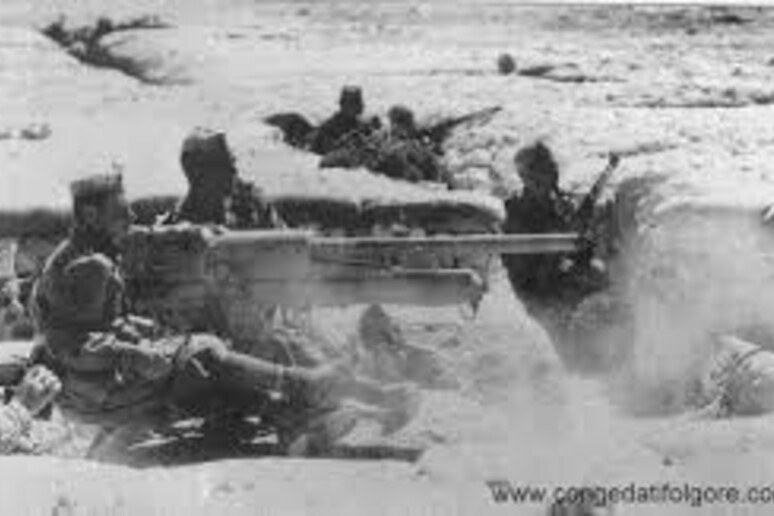Italian troops who fought
and were defeated in the battle of El Alamein "lost with great
honour," the Italian Defence ministry chief of staff Luigi
Binelli Martelli said Friday.
Speaking at a ceremony in the Tuscan port city of Livorno
to mark the 72nd anniversary of the 2nd World War battle between
Allied and Axis forces in north Africa, Mantelli paid tribute to
3,500 Folgore regiment paratroopers who took part valiantly with
very heavy losses sustained against British troops, saying that
"spirit of service and cohesion are fundamental elements for the
operational capacity of the armed forces."
"The paratroopers have always shown this. El Alamein was a
battle that was lost with great honour, facing up to
overwhelmingly superior fire power with poor weapons but with
great spirit and capacity to resist and to hold up high the
honour of Italy".
The ceremony held at the Vannucci barracks was attended by
Army Chief of Staff Claudio Graziano as well as the current
commanding officer of the Folgore, Lorenzo D'Addario.
Italy has made strides in recent years in reversing the
stereotypical image of the Italian soldier's alleged eagerness
to retreat or surrender in WWII.
Two years ago, on October 30, 2012, an historical park was
unveiled on the battle site to show visitors key points
in the showdown in the Egyptian desert.
The 1942 battle turned the tide in the Allies' favour
despite what is now recognised as uncommon resistance by the
Italian soldiers who won praise from Winston Churchill by
fighting as fiercely as the Germans against high odds and their
own limitations in equipment and weapons.
Padua University has worked with 266 volunteers on the
three-year project, wholly funded by private donations, which
also aims to protect the site from oil exploration and coastal
building development.
There has been an upsurge of interest in the battle in
recent years and a greater awareness in Italy and abroad of the
courage shown by the Italian soldiers who fought there.
A major exhibition on the battle was staged in Milan in
2008, when documentaries were shown on national TV and the movie
'El Alamein' came out.
The conviction that Italian troops fought heroically at
El Alamein had been championed most visibly by the now-defunct
rightwing National Alliance party, which evolved from Italy's
post-war Italian Social Movement (MSI) neo-fascist party.
But politicians on the centre left have also said that,
despite having been on the "wrong side," Italian soldiers at El
Alamein saved the honour of the army.
Non-Italian war historians also revised a traditionally
negative view of the nation's military, typified by jokes about
Italian tanks having nine reverse gears and only one to go
forward.
A 2007 book on El Alamein by two British historians, John
Bierman and Colin Smith, had several good things to say about
Italian soldiers in the North African campaign.
''The Italian tank regiment, despite the prattle about
the abundance of reverse gears, fought with great audacity,
just as the 'Ariete' artillery regiment did,'' Bierman told
Italian TV in an interview.
According to American historian John W.Gordon, whose
book Behind Rommel's Lines was recently translated into
Italian, the British special forces were so impressed by the
methods and tactics of the Italian desert corps that they
actually copied them.
Italy's crack paratrooper regiment, the 'Folgore,' sent
some 5,000 of its men to El Alamein. Only 304 returned.
''The paratroopers threw themselves against oncoming
tanks with Molotov cocktails and live mines,'' said Francesco
Marini Dettina, a survivor of the battle who was awarded a
silver medal for valour.
Interviewed for a documentary, Dettina said: ''They
urged us to surrender but the only answer they got came from
the artillery with our last remaining shells. The British
were surprised by the Italians' behaviour.''
Churchill said in a speech to the House of Commons a month
after El Alamein: ''We must honour the men that were the Lions
of the Folgore''.
The 13-day battle pitted Allied soldiers under the command
of British Field Marshal Bernard Montgomery against Italian and
German troops led by Erwin Rommel from October 23 to November 4,
1942.
ALL RIGHTS RESERVED © Copyright ANSA











